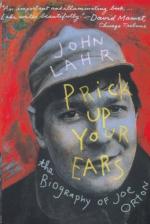|
This section contains 5,292 words (approx. 18 pages at 300 words per page) |

|
SOURCE: Innes, Christopher. “Joe Orton (1933-67): Farce as Confrontation.” In Modern British Drama: The Twentieth Century, pp. 293-306. Cambridge, England: Cambridge University Press, 2002.
In the following essay, Innes discusses the farcical elements of Orton's plays, noting that his outrageous situations and characters celebrated anarchy in their depiction of the universality of the abnormal and the dishonest.
Farce gained fresh relevance in the 1960s with Joe Orton's explosive, but short-lived eruption onto the English stage, which paved the way for Peter Barnes (see pp. 352ff. below) and influenced Howard Brenton's first short satirical pieces at the end of the decade. Savage and irreverent, Orton caught the sexual permissiveness and growing political dissent of the time. Yet although he struck a distinctive new note, his work was also a continuation of earlier trends.
Indeed, his first major farce, Loot (1965), clearly echoed Ben Travers' 1928 classic, Plunder, in its title as well...
|
This section contains 5,292 words (approx. 18 pages at 300 words per page) |

|


